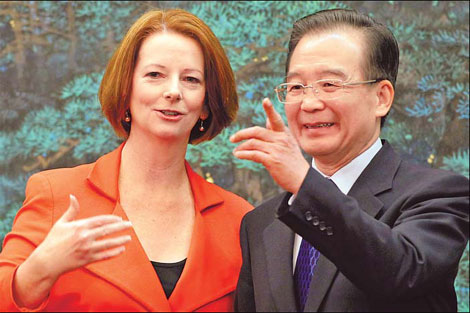Foreign and Military Affairs
China, Australia ties get trade boost
By Wu Jiao (China Daily)
Updated: 2011-04-27 07:25
 |
Large Medium Small |
Wen and Gillard sign deals to increase economic cooperation
BEIJING - China and Australia signed a series of cooperation agreements on Tuesday as Australian Prime Minister Julia Gillard attempted to boost ties and smooth over recent spats with China.
 |
|
Premier Wen Jiabao chats with Australian Prime Minister Julia Gillard during a welcoming ceremony at the Great Hall of the People in Beijing on Tuesday. [Wu Zhiyi / China Daily] |
Yet analysts said that achieving smooth bilateral ties would take some time despite strong trade relations.
There was an upbeat tone for the visit on Tuesday with a lavish red-carpet welcoming ceremony given by Premier Wen Jiabao, and a signing ceremony for bilateral agreements witnessed by both Wen and Gillard following their meeting at the Great Hall of the People, the seat of the legislature in the heart of Beijing.
According to a press release by the Foreign Ministry, both Wen and Gillard agreed to further economic and trade cooperation in a bid to promote bilateral ties.
Opening their discussions, Wen reaffirmed the importance of China's relations with Australia, saying that "we have always seen Australia as an important partner in our win-win relationship".
Wen proposed that the two states establish "long-term and stable strategic cooperative ties" amid booming cooperation in energy and natural resources.
He also encouraged bilateral cooperation in the research, development and utilization of new, clean and renewable energy, as well as in the construction of information networks, rail systems and ports.
| ||||
Gillard said Australia's economic ties with China were "in good shape" and trade between the two countries was growing in "leaps and bounds".
Gillard also said that Australia welcomes more Chinese students and tourists and greater investment, despite a number of controversial incidents.
In 2009, China Nonferrous Metals Mining Group Co Ltd was blocked from buying a controlling stake in rare earths miner Lynas Corp.
Australia also stymied China Minmetals Corporation's bid for Oz Minerals' Prominent Hill copper and gold mine because the mine was too close to a defense rocket range.
Of the five agreements signed by the two countries on Tuesday, one allows for the establishment of a joint fund, worth $18 million over four years, for science cooperation, according to ABC News.
Another enables Tourism Australia to promote products to individual Chinese customers and not just tour groups.
Gillard is the first Australian prime minister to visit China in three years.
Despite robust bilateral trade, ties deteriorated in 2009 after China arrested Australian iron industry executive Stern Hu and later sentenced him to 10 years in prison on charges of bribery and infringing trade secrets.
The two sides also feuded over Australia's permission for Uygur separatist leader Rebiya Kadeer to visit in August 2009 despite China's strong objections.
Observers said that for Australia, finding the balance between courting and criticizing China is especially tricky.
According to Reuters, no advanced economy is as dependent on China for its fortunes, but as a close ally of the United States shares many of Washington's concerns.
China buys more than a quarter of Australian exports, having overtaken Japan as the country's largest trading partner in early 2009. Two-way annual trade has now passed $107 billion, up from $61 billion in 2009.
"There's a desire on both sides to put 2009 behind them. I think the government is looking to reset the relationship and put it on a more pragmatic footing," said Andrew Shearer, director of studies at the Lowy Institute for International Policy in Sydney, who formerly worked as a policy adviser in the Australian government.
Yet analysts also warned that Australia's China policy means that it is hard to expect an overhaul in bilateral ties.
Gillard's visit to China follows the release of a survey showing 75 percent of Australians viewed China's growth as good for Australia, but 57 percent believed there was too much Chinese investment there.
The survey published by the Lowy Institute on Monday also shows Australians remain concerned over Beijing's military power and global influence.
According to Su Hao, an expert on international security at the China Foreign Affairs University, Gillard's adjustment to Australia's China policy is only on the economic level, not on the strategic level.
"The mutual mistrust is still there," Su said.
According to Su, Gillard's visit to the Republic of Korea and Japan in the last few days, and her support for defense ties with them, sent negative signals to China, and possibly means a backward step in Australia's China policy.
Reuters and ABC News contributed to this story.



